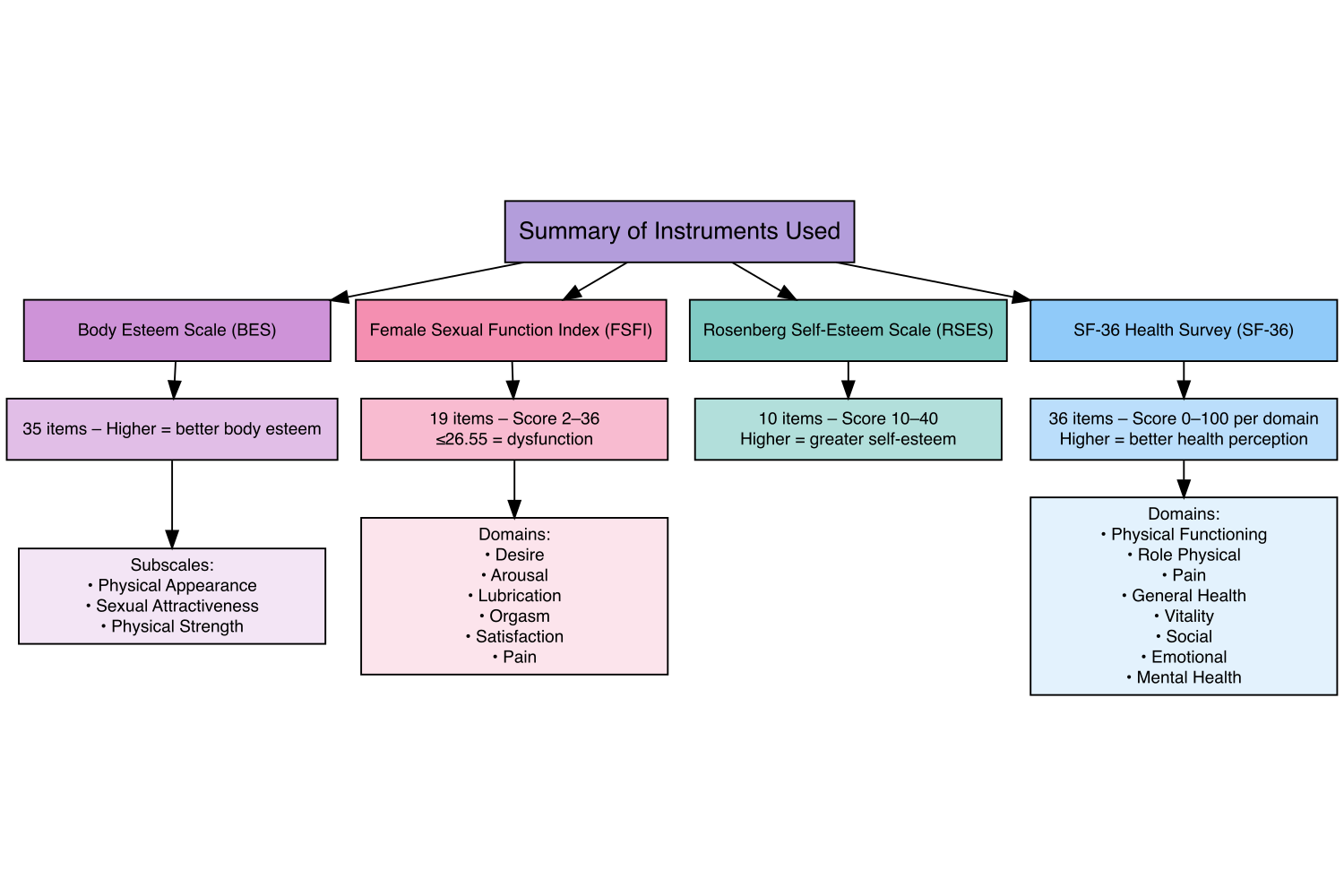Session Information
Date: Monday, October 27, 2025
Title: Abstracts: ARP I: Multidimensional Influences on Health in SLE (1686–1691)
Session Type: Abstract Session
Session Time: 3:15PM-3:30PM
Background/Purpose: SLE predominantly affects women and is often accompanied by physical changes and psychological distress. Although both body image dissatisfaction and sexual dysfunction are reported in SLE, their relationship remains unclear. We sought to determine whether body esteem is independently associated with overall sexual function in women with SLE.
Methods: In this cross-sectional observational study, we analyzed data from 38 adult women who all met the 2019 EULAR/ACR classification criteria for SLE. Participants completed the Body Esteem Scale (BES), the Rosenberg Self-Esteem Scale (RSES), the Female Sexual Function Index (FSFI), and the SF-36 v2 questionnaire (Figure 1). Steroid exposure was measured as the total number of months the patient had received steroid treatment, from initiation to the most recent use. Principal component analysis summarized the three BES subscales into a single component: PC1-BES. We used linear regression to predict the FSFI total score and assessed interactions, nonlinearity, outliers, and subdomain effects. Statistical significance was set at α = 0.05.
Results: The mean±SD age was 35.8±12.6 years, disease duration was 7.5±6.8 years, and months of steroid exposure were 29.3±36.5 months. In the adjusted model, greater body esteem (PC1-BES) was significantly associated with higher FSFI scores (β = 1.990; 95% CI, 0.730 to 3.250; p = 0.003), independent of self‑esteem (RSES; β = 1.190; 95% CI, 0.440 to 1.930; p = 0.003) and months of steroid exposure (β = 0.070; 95% CI, 0.020 to 0.130; p = 0.011). The model explained 27% of the variance in sexual function (R² = 0.270), with overall fit significant (F(3,34) = 6.470; p = 0.001) (Figures 2 and 3).The interaction and non-linearity tests did not yield significant findings. Subdomain analyses revealed consistent positive associations between PC1-BES and FSFI domains of arousal, lubrication, orgasm, satisfaction, and pain (all p < 0.05). Adding the eight SF-36 subscales did not improve model performance.
Conclusion: Among 38 women with SLE, higher body esteem is independently and positively associated with overall sexual function (FSFI), independent of self-esteem (RSES) and steroid exposure. This relationship was consistent across the FSFI subdomains. Addressing concerns about body image should be considered in comprehensive SLE care to improve sexual health and quality of life. Interventions targeting body image, such as cognitive-behavioral therapy, may improve sexual health. The independent positive link observed with months of steroid exposure warrants longitudinal investigation to clarify its role.
 Figure 1: Flowchart detailing the instruments used (BES, FSFI, RSES, SF-36), including the number of items, score interpretation, and corresponding domains assessed.
Figure 1: Flowchart detailing the instruments used (BES, FSFI, RSES, SF-36), including the number of items, score interpretation, and corresponding domains assessed.
.jpg) Figure 2: Forest plot of standardized regression coefficients (β) ± 95% confidence intervals for PC1-BES, RSES, and months of steroid exposure in the multivariable model predicting FSFI total score.
Figure 2: Forest plot of standardized regression coefficients (β) ± 95% confidence intervals for PC1-BES, RSES, and months of steroid exposure in the multivariable model predicting FSFI total score.
.jpg) Figure 3: Scatterplot of PC1-BES versus FSFI total score with fitted regression line (β = 1.99, p = 0.003) and 95% confidence ribbon (R² = 0.36).
Figure 3: Scatterplot of PC1-BES versus FSFI total score with fitted regression line (β = 1.99, p = 0.003) and 95% confidence ribbon (R² = 0.36).
To cite this abstract in AMA style:
Martinez-Espinosa H, Esquivel Valerio J, Núñez-Elizondo A, Rivera-Villafuerte R, Corral-Trujillo M, Garcia-Arellano G, Arvizu-Rivera R, Serna-Peña G, Galarza-Delgado D, Cardenas-de la Garza J. Body Esteem and Sexual Function in Women with Systemic Lupus Erythematosus [abstract]. Arthritis Rheumatol. 2025; 77 (suppl 9). https://acrabstracts.org/abstract/body-esteem-and-sexual-function-in-women-with-systemic-lupus-erythematosus/. Accessed .« Back to ACR Convergence 2025
ACR Meeting Abstracts - https://acrabstracts.org/abstract/body-esteem-and-sexual-function-in-women-with-systemic-lupus-erythematosus/
